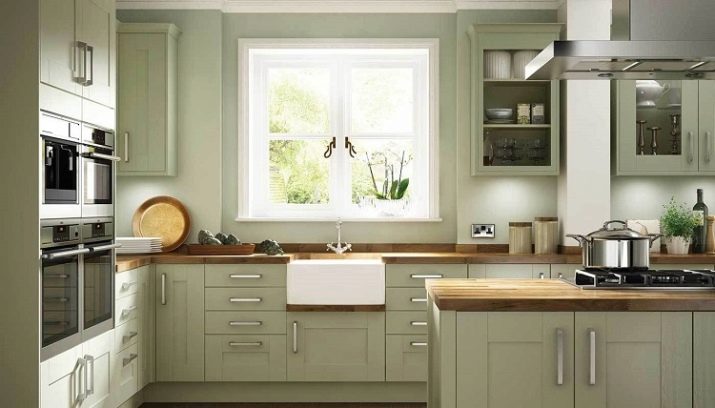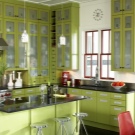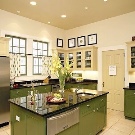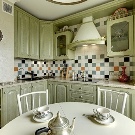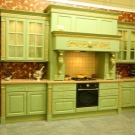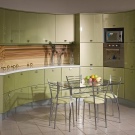Olive cuisines: color characteristics and popular combinations
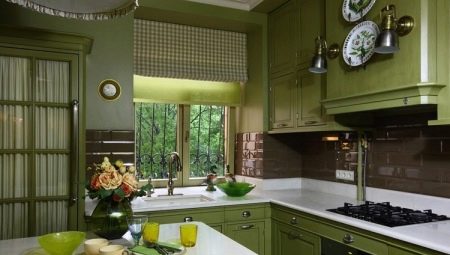
Olive cuisine is a very common solution that is especially appreciated by lovers of discreet and balanced interiors. This unusual shade of green charges with a positive, but without an excess of dynamics and excessive emotions.
A kitchen decorated with a predominance of olive colors will always be elegant and neat.
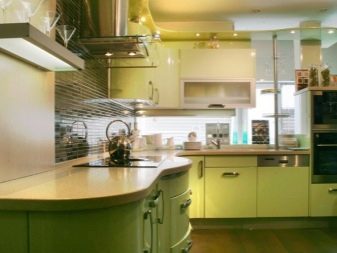
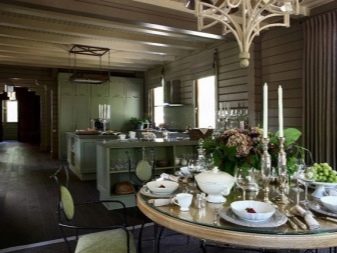
Palette of shades
The palette of olive shades includes a range from pale green-yellow to dark marsh and khaki, pistachio and earthy shades are also included here, so everyone can always find a shade for themselves to taste. Among all the variety of colors, olive is considered the most natural and safe, these colors are devoid of excessive loudness and brightness, create a feeling of warm sun in an early autumn day.
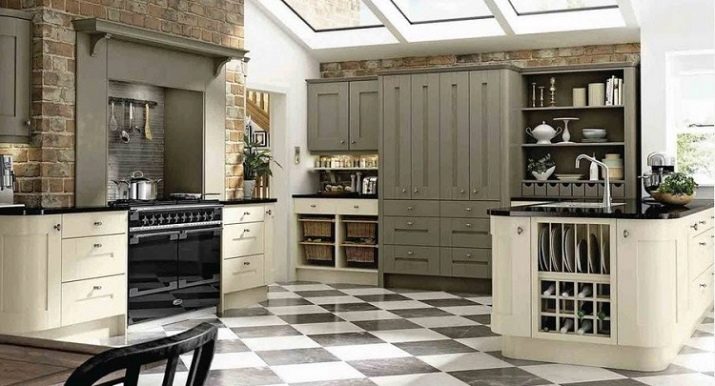
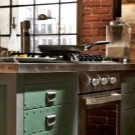
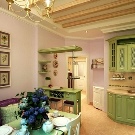
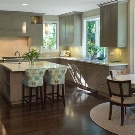
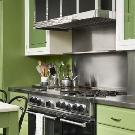
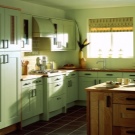
The classic shade is considered to be dark green with shades of yellowish - this color resembles the harvested and processed fruits of ripe olives, although in their natural environment they are more likely to have the color of an unripe plum and have half-tones from light green with a light bluish bloom to deep purple and even black.


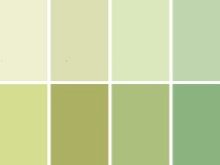
When decorating a kitchen space in olive colors, you need to take into account some of the features of this tone.
- Olive kitchens visually reduce the space, so such solutions are optimal only for spacious kitchens, and only appropriate accents are allowed in small ones.
- The kitchen should face a sunny side and have good artificial lighting, otherwise it will give a rather gloomy impression.
- Olive color looks harmoniously in a variety of styles, classics, high-tech, modern and Provence look especially good. The only exception, perhaps, is only Gothic.
- In such interiors, you need to select the appropriate accessories - these can be curtains with floral patterns, panels with an image of an olive tree, all kinds of paintings and panels on a Mediterranean theme.
- All shades of olive have the most beneficial effect on the state of the human psyche - this color helps to relieve nervous tension, relaxes and creates conditions for lively and warm communication.
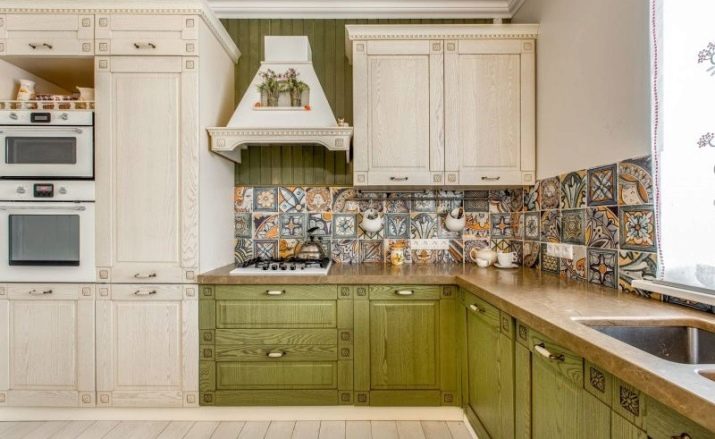
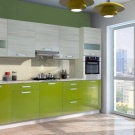
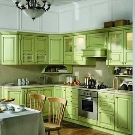
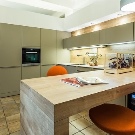
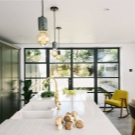
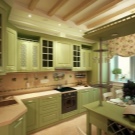
Selection and placement of kitchen units
When choosing an olive set, you can use both glossy and matte surfaces. Gloss looks harmoniously in a modern style, and matte facades are optimal for classics and Provence. As for the shape of the headset, given the fact that olive-colored kitchens are most often decorated in spacious rooms, island modules will be the best option. In this case, the elements of the headset and the working area are placed along the walls, and the dining area or bar counter is taken out to the center of the room.
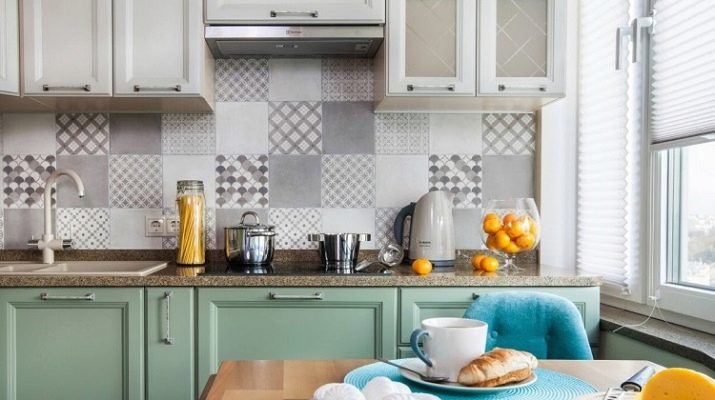
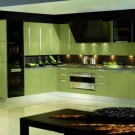
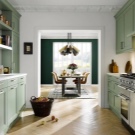
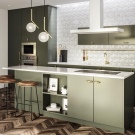
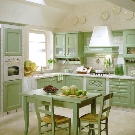
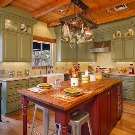
However, if desired, you can also use a linear arrangement, when all modules are installed near one wall. The purchase of corner headsets will be a universal solution. - in this case, the furniture is placed near the perpendicular walls, and the dining area is equipped in the opposite corner.
This layout allows you to visually expand the space, which is especially important if the kitchen is decorated in olive tones.
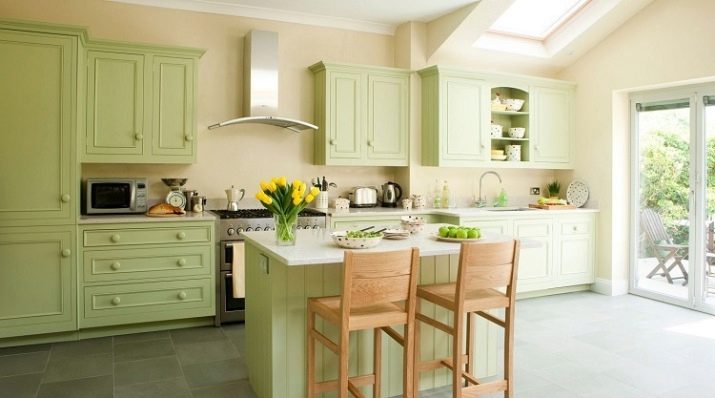
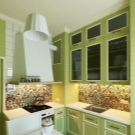
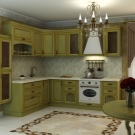
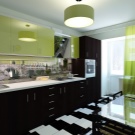
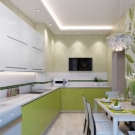
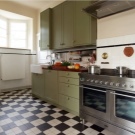
Successful color combinations
The monochrome olive color in the interior is not very attractive and therefore quickly tires. It will be right to combine this color scheme with other shades. Olive is best complemented by dusty-warm tones with natural textures. Eggplant is considered to be a contrasting tone to it, and light brown, rich mustard, white-beige or pastel yellow are complementary. To design accents, you can use pale pink, deep burgundy or terracotta shades.
The choice of the optimal color combination largely depends on the style in which you decorate the kitchen, but it is believed that natural combinations borrowed from nature will look best.
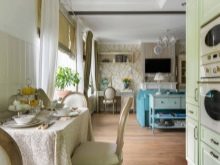
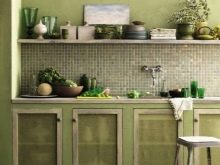
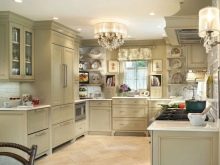
The most successful solution would be a white-olive palette, it can be present both in classic kitchens and in modern interiors. White is quite elegant, so you can give the room a very different mood by changing the details, sizes and proportions. The traditional combination is olive and brown; this solution is often found in nature - a muted green with hints of wood, stone and earth. You can confidently complement olive with shades from beige to brown.
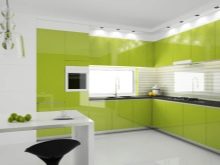
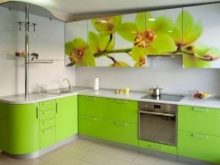
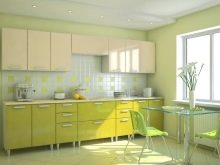
Gray-black colors are well combined with shades of green, while the first tone must certainly be the main one. Dark tones are optimal as stylish accents, you can use light shades of gray - they will effectively emphasize the softness of olive. And if you prefer interiors in a modern style, it is better to make a choice in favor of metallic gray.
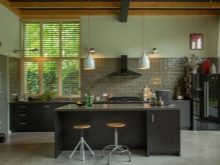
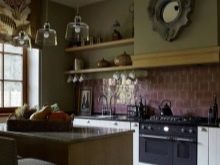
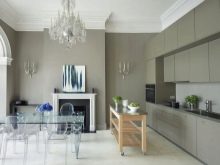
Olive with sunny lime looks very impressive, especially when implementing modern interior projects. In this case, it is advisable to use glossy facades with laconic geometry without unnecessary decor. Lime tones will become a real decoration if you use them as accents when choosing an apron, curtains and decorative elements. Lime color can also be used to decorate the top modules of kitchen sets.
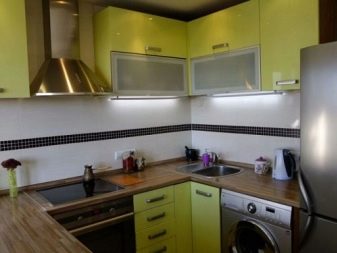
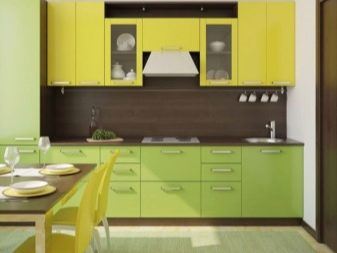
Intense orange is harmoniously complemented by noble terracotta, such a union invariably creates an atmosphere of warmth, joy and positiveness in the room. At the same time, orange can become the main tone in furniture, and olive will cover the walls and complement the set in all details.
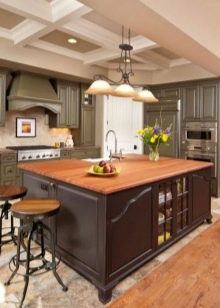
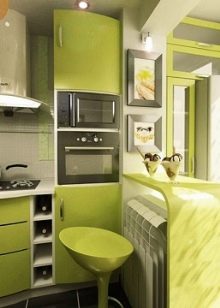
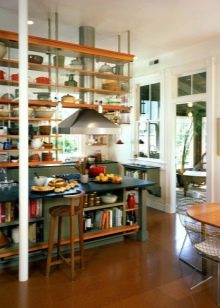
Style selection
Despite the fact that olive colors are traditionally perceived in close association with the village houses of the Italian and French provinces, they will harmoniously fit into the most ultra-modern interior options. At the same time, the same tone will look different on different surfaces, and the features of furniture, decor options and finishes will only emphasize the stylistic composition being created.
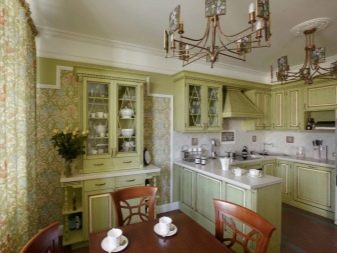
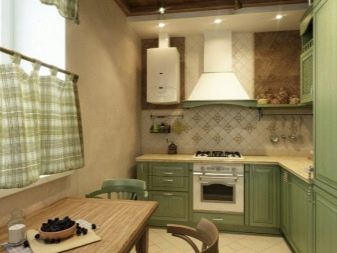
Olive is most often used for classic-style furnishings. Such kitchens are presented in the catalogs of the most elite sets, usually they are made of solid wood of valuable species and decorated with carvings. Household appliances and retro-style accessories are harmoniously combined with such furniture, they can be olive-gray, silver and golden, an oven with a semicircular glass and a hood in the form of a bleached pipe, as well as antique brass mixers, would be appropriate here.
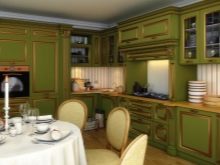
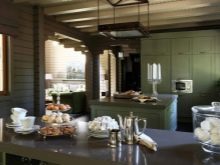
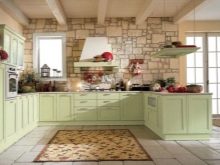
Traditional olive kitchens in most cases are equipped with white or beige marble countertops, and the refrigerator and small household appliances are necessarily hidden behind the doors of the facades. Otherwise, the integrity of the design will be compromised. Modern trend in olive design is no less harmonious. When choosing cladding materials and furniture, preference should be given to laconic minimalism, an abundance of gloss and smooth surfaces.
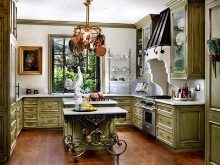
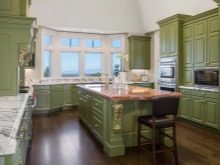
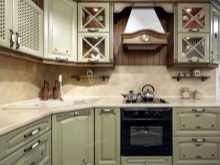
Usually, when decorating a kitchen in a similar style, polymer coatings, glass and metal are used. Olive headsets with contrasting elements look harmonious in these interiors. For example, the bottom of the headset can be made of polished wood or be pasted over with a film of some other suitable color, and the top can be in the color of classic olive. Muted green works well with steel or mirror black finishes.
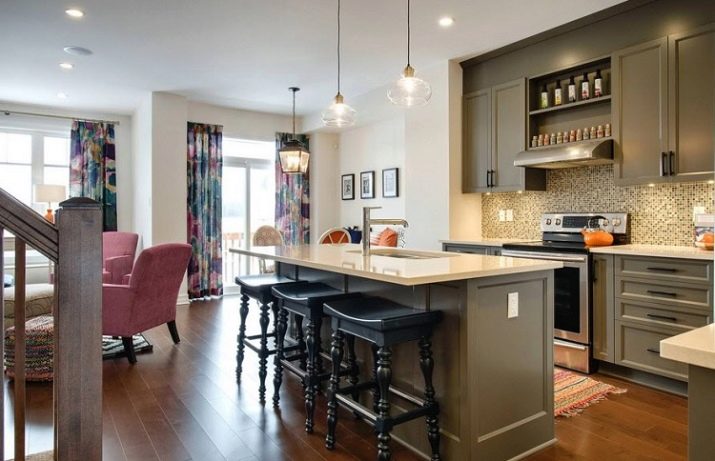
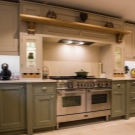
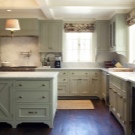
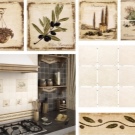
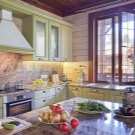
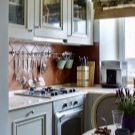
The olive tree is a typical Mediterranean plant, so an appropriate style would be good for this color. Additional elements of the shade of light marble, terracotta brick, beige sandstone or red clay are taken to the main color palette.
We draw special attention to the fact that smooth vaulted ceilings are considered a real highlight of the Mediterranean interior, as well as a horizontal semi-oval, which is repeated in the outlines of interior arches, window openings, kitchen hoods and stove doors.
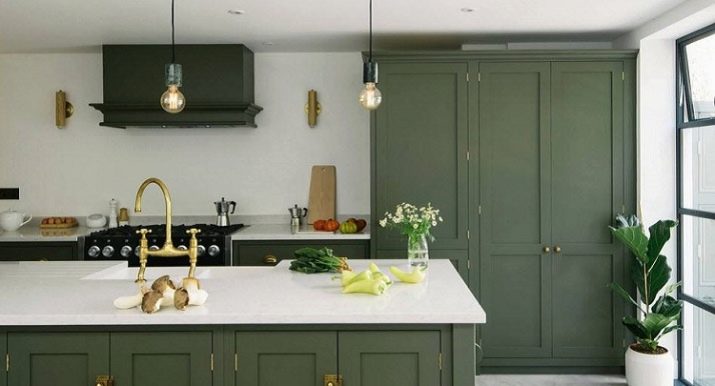
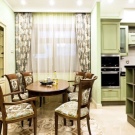
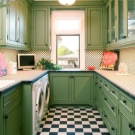
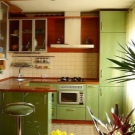
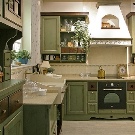
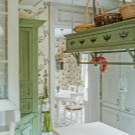
Olive color is often used when decorating Provence-style kitchens - motives of the French province are best combined with nude shades. In this case, olive should be matte, and in tandem with it, you can use milky, nude and light pink colors.
Wallpaper with a discreet "chintz" pattern looks beautiful in a large spacious Provence kitchen, as well as curtains in pastoral colors, the oven and hood must certainly be vintage. In a large kitchen, wallpaper with small decor in the spirit of the late 19th and early 20th centuries will look quite impressive, and the best accessories in such a room will be fruit still lifes, tableware with delicate ornaments and panels.
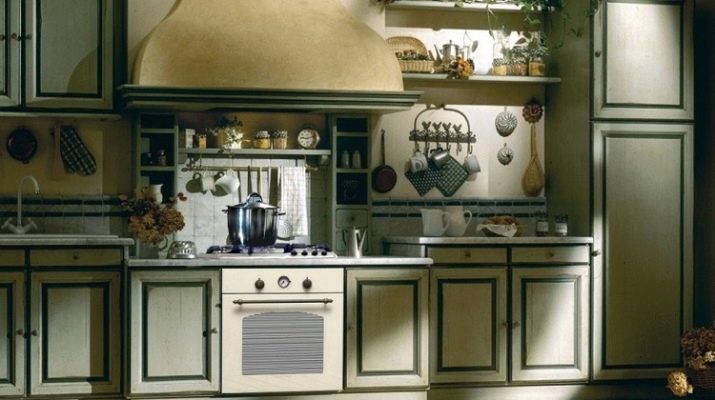
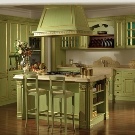
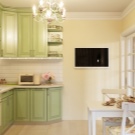
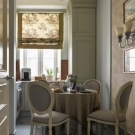
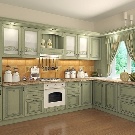
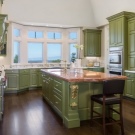
Recommendations for the design of a monochrome kitchen interior
Usually olive color is good for decorating a kitchen with an area of more than 9 square meters. m, most often this tone is used to decorate one or several walls, or they complete the room with an appropriate set. However, you cannot use a monochrome design, in which both the walls and the headset are made in shades of olive color. It is desirable to distribute the tones in a slightly different way.
- If the headset is made in olive tones, then the walls and ceiling should be creamy white, light beige or cream. In this case, the color scheme of the dining area should be made either in a natural wood palette of a light spectrum, or go in tune with the walls.
- A large corner sofa in a rich olive color can set the tone in the kitchen; alternatively, you can place an olive-colored rug under the dining table, while the table and the chairs around it should be white or light brown. A harmonious addition to such a room will be a suspended chandelier in the center with glass or bronze elements. Don't forget about additional spot lighting.
- It is advisable to decorate the windows with textiles of a deep olive or grayish-silver color, and it is better to make the walls in such a kitchen lighter.
- When choosing cladding materials for an olive kitchen, you need to pay special attention to the style of the room and take into account their practicality. You should use textures that harmoniously complement each other. The most practical option for finishing the floor will be tiles, it is advisable to install a water or electric heating system under it. Thus, the surface in the dining area will always be comfortable for the feet. However, you can resort to more budget options, for example, linoleum in the color of terracotta porcelain stoneware, light yellow sandstone or a laminate of greenish-white undertones with veins. In the olive dining room, the texture of the self-leveling floor looks harmonious, as well as smooth glazed ceramic tiles.
- A suitable backdrop for an olive set would be a simple whitewashed wall or wall panels in nude tones. Depending on the area of the kitchen and the saturation of the shade, the headset is chosen in creamy, beige, gray or pink tones. To make the room more accent, you need to add some dark blue or glossy black tones. You can revive the shades by adding vibrant color prints to table textiles and a kitchen apron.
- The white ceiling has always been considered a winning option in the vast majority of interiors, but in the case of the olive palette, it gives way to sandy and light beige colors. In tandem with glossy facades, mirror stretch canvases in black color look good - a similar solution is often used for high-tech or minimalist rooms.
- For rustic décor, raw or whitewashed beams can be used to complement olive country.
For Mediterranean interiors, a good tandem with olive furnishings is a brick-like wallpaper glued to a high vaulted ceiling.
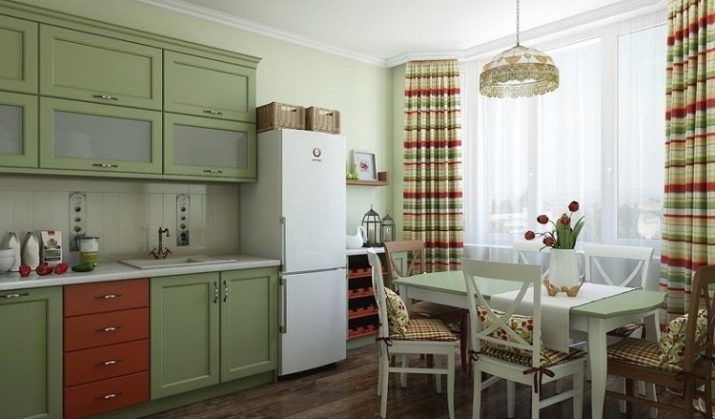
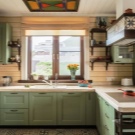
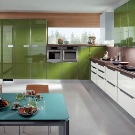
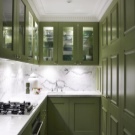
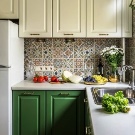
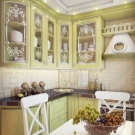
Beautiful design examples
In the photo selection below, you can find many original ideas for decorating a kitchen in olive tones. We have prepared options for both kitchens located in apartments of various sizes, and for country houses.
We hope you can easily choose the best option for each specific case from the proposed examples.
